De Canadese dichter, schrijver en acteur Sky Gilbert werd geboren op 20 december 1952 Norwich, Connecticut. Zie ook alle tags voor Sky Gilbert op dit blog.
Montreal Soir
Peter had invited me for coffee, first,
at that restaurant with the unpronouncable name
and of course he was sitting there with James.
I was impressed, as well I should be.
(Isn’t it interesting the way people introduce the ones they love? “Sky this
is James”, and of course, I tripped and almost fell into him and then he
wanted to know about my tattoo. It’s important not to be too fascinating-
result: jealousy, or too disinterested- result: hurt)
James asked about the various forms of neuroses and Peter was in his
element- father, teacher, pedant, wit:
“Well Gestalt describes three types of neurosis: projection, introjection
and retrogression.”
Peter and I agree that we have all three. James is confused and interested,
and goes home, almost stealing Peter’s hat.
As Peter and I make our trek to the strip bar I realize that the poets are
wrong; one-sided love is not hopeless – it’s the other way around. Peter and
James are clearly in love with each other equally, and that of course is why
they will never be happy together. The obsession is too equal. Neither is
crying and sighing hopelessly. Neither is telling the other what to do
(I.E.: MARRIAGE). Two people equally in love? That’s a stalemate, a prison,
two pairs of eyes endlessly staring fearfully into the void. Dare I know
that soul (it loves me as I love it)? Why no, I dare not.
And we’re at the strip bar and the boys whirl perilously around us. One boy
has made pants out of ripped jeans and a pair of chaps. Another surprises us
with his long cock. Another sits, pouting, by the slot machine, but every
time he moves, Peter and I gasp.
And of course these boys make me think about death. As they always do.
For those who are obsessed with the body are obsessed with death. We are all
too aware of how the body changes. Each pimple, each wrinkle, announces
death’s imminence. And you can lock yourself in your house and roll up your windows
and make dinner.
Or you can throw yourself into the body of that young man, with every ounce
of fury you have left.
Death will come either way. But we imagine that watching it’s inevitable
approach is a kind of cheat, is beating the game.
And we are always running, with our back to the moon, and hiding, with our
face in the sun, and yelling, with the music in our ears.
Our desperate escapes! How we love them, as we love our boys, and though we
are reluctant to admit it, they love us too.
Or then again, perhaps we’re just two old queens sipping beer at the Adonis,
and it needn’t be any more important than that.
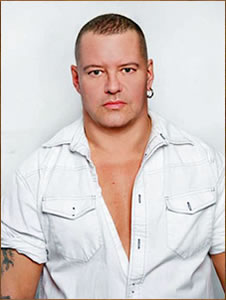
Sky Gilbert (Norwich, 20 december 1952)
De Oostenrijkse dichteres en schrijfster Friederike Mayröcker werd op 20 december 1924 in Wenen geboren. Zie ook alle tags voor Friederike Mayröcker op dit blog.
lieber in Gedanken reisen, Hokusai
auf dem Rücken, oder unter der Lampe,
laufen zu Füßen des Fuji und blicken hinauf
zu verschneiter Spitze, die Schürstiefel
feucht und kalt, die Halskrause welk.
Wie, frage ich, Erkundungen einer Ferne
mit den eigenen Füßen, wie, frage ich, Erfahrungen einer Ferne
mit den eigenen Augen. Wie Sehnsucht nach Ferne
mit Seßhaftigkeit vereinen. Wie, Fuß und Auge,
Träne und Lust.
eines Lebensabschnittes Bestandaufnahme
in meinem Tornister
ein Thymianstämmchen
zwei Münzen
ein stumpfer Bleistift
zerknitterte Notizen
Keksbrösel
eine grüne Wäscheklammer
die Visitkarte einer japanischen Germanistin
ein zerbrochener kleiner Kamm
Dalís Ameisen auf einem verschatteten Notenblatt
für Emi Neckamm
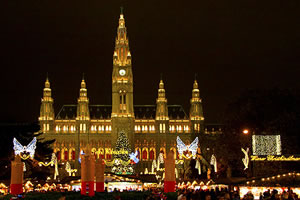
Friederike Mayröcker (Wenen, 20 december 1924)
De kerstmarkt bij het Weense Raadhuis
De Amerikaanse dichteres en schrijfster Sandra Cisneros werd geboren op 20 december 1954 in Chicago. Zie ook alle tags voor Sandra Cisneros op dit blog.
Uit: Caramelo
„We’re all little in the photograph above Father’s bed. We were little in Acapulco. We will always be little. For him we are just as we were then.
Here are the Acapulco waters lapping just behind us, and here we are sitting on the lip of land and water. The little kids, Lolo and Memo, making devil horns behind each other’s heads; the Awful Grandmother holding them even though she never held them in real life. Mother seated as far from her as politely possible; Toto slouched beside her. The big boys, Rafa, Ito, and Tikis, stand under the roof of Father’s skinny arms. Aunty Light-Skin hugging Antonieta Araceli to her belly. Aunty shutting her eyes when the shutter clicks, as if she chooses not to remember the future, the house on Destiny Street sold, the move north to Monterrey.
Here is Father squinting that same squint I always make when I’m photographed. He isn’t acabado yet. He isn’t finished, worn from working, from worrying, from smoking too many packs of cigarettes. There isn’t anything on his face but his face, and a tidy, thin mustache, like Pedro Infante, like Clark Gable. Father’s skin pulpy and soft, pale as the belly side of a shark.
The Awful Grandmother has the same light skin as Father, but in elephant folds, stuffed into a bathing suit the color of an old umbrella with an amber handle.
I’m not here. They’ve forgotten about me when the photographer walking along the beach proposes a portrait, un recuerdo, a remembrance literally. No one notices I’m off by myself building sand houses. They won’t realize I’m missing until the photographer delivers the portrait to Catita’s house, and I look at it for the first time and ask, – When was this taken? Where?
Then everyone realizes the portrait is incomplete. It’s as if I didn’t exist. It’s as if I’m the photographer walking along the beach with the tripod camera on my shoulder asking, -¿Un recuerdo? A souvenir? A memory?“
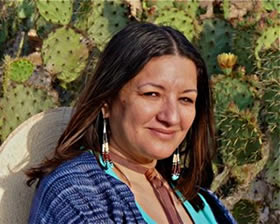
Sandra Cisneros (Chicago, 20 december 1954)
De Amerikaanse schrijfster Hortense Calisher werd geboren in New York op 20 december 1911. Zie ook alle tags voor Hortense Calisher op dit blog
Uit: The Beautiful and Damned
“Anthony Patch In 1913, when Anthony Patch was twenty-five, two years were already gone since irony, the Holy Ghost of this later day, had, theoretically at least, descended upon him. Irony was the final polish of the shoe, the ultimate dab of the clothes-brush, a sort of intellectual “There!”—yet at the brink of this story he has as yet gone no further than the conscious stage. As you first see him he wonders frequently whether he is not without honor and slightly mad, a shameful and obscene thinness glistening on the surface of the world like oil on a clean pond, these occasions being varied, of course, with those in which he thinks himself rather an exceptional young man, thoroughly sophisticated, well adjusted to his environment, and somewhat more significant than any one else he knows.
This was his healthy state and it made him cheerful, pleasant, and very attractive to intelligent men and to all women. In this state he considered that he would one day accomplish some quiet subtle thing that the elect would deem worthy and, passing on, would join the dimmer stars in a nebulous, indeterminate heaven half-way between death and immortality. Until the time came for this effort he would be Anthony Patch—not a portrait of a man but a distinct and dynamic personality, opinionated, contemptuous, functioning from within outward—a man who was aware that there could be no honor and yet had honor, who knew the sophistry of courage and yet was brave, a worthy man and his gifted son Anthony drew as much consciousness of social security from being the grandson of Adam J. Patch as he would have had from tracing his line over the sea to the crusaders. This is inevitable; Virginians and Bostonians to the contrary notwithstanding, an aristocracy founded sheerly on money postulates wealth in the particular.”
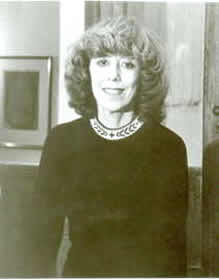
Hortense Calisher (20 december 1911 – 15 januari 2009)
De Turkse dichter en schrijver Aziz Nesin werd geboren op 20 december 1915 in Istanbul. Zie ook alle tags voor Aziz Nesin op dit blog.
Uit: Memoirs of an exile (Vertaald door Joseph S. Jacobson)
“My father, like every good father who gives thought to his son’s future, advised, forget this silly idea of writing and take a good honest job, one you can make a living at! I was beyong listening to him.
My obstinacy didn’t stop there. Although I wished to be a writer, yearned to take a pen in hand, I entered a school where they would thrust a rifle in my hand. During my early years I couldn’t do what I liked, and didn’t like what I did do. I wanted to become a writer, but became a soldier. At that time, the only schools where poor, penniless children could study free, were military schools; therefore I was forced to enter a military boarding school.
In 1933 when the surname law was passed, which directed every Turk to select a last name, people’s secret feelings of inferiority surfaced: Some of the world’s stingiest became known as Eliacik (Openhanded) the greatest cowards named themsleves Yurekli (Stouthearted) and many of the laziest took the name Calishkan (Industrious).
One of our teachers chose the surname of Ceviker (Dexterous) when he could barely sign his name to a letter. The rampant racism present caused people with mixed blood to grab for surnames which signified they were Turks.
Invariably I came last in any kind of scramble; I was no different in this one for nice surnames. No surname remained that I could take pride in, so I assumed the name of Nesin (What-are-you?). I wanted to think of what I was and pull myself together whenever anyone called, What-are-you! In 1937 I became an officer, you know, a Napoleon. Well really, I was merely one of the Napoleons. Every new officer thinks himself Napoleon. Some of them never recover from this sickness; it lasts a whole lifetime. Others are cured after a while. ‘Napoleonitis’ is a dangerous and contagious disease. The symptoms are these: The victims think only of Napoleon’s victories, never of his defeats; they are prone to tuck a right hand between jacket buttons; they stand before a map of the world, drawing with a red crayon and, after subjugating and occupying the entire world in five minutes, regret that the world is so small. Victims of this disease rave as in a high fever. There are other dangers. In later stages, they may fancy themselves Tamerlane, Ghengis Khan, Attila, Hannibal, Moltke, even Hitler or others such as these…”
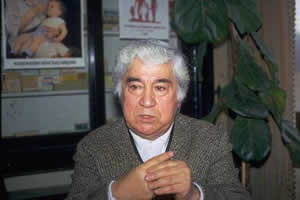
Aziz Nesin (20 december 1915 – 6 juli 1995)
Zie voor nog meer schrijvers van de 20e december ook mijn drie blogs van 20 december 2011.
